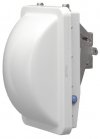Ruckus Wireless SmartMesh

Ruckus Wireless SmartMesh introduces a fresh, new approach to constructing high-performance wireless LANs by reducing cumbersome and costly Ethernet cabling to individual ZoneFlex Wi-Fi access points.
SmartMesh Networking dramatically reduces the cost of installation and speeds up the deployment of a wireless network. With SmartMesh Networking, organisations can simply plug access points into any convenient power supply and walk away.
SmartMesh Features
- Utilises patented Ruckus BeamFlex directional smart Wi-Fi antenna array technology
- Automatic access point provisioning
- Centrally managed by Ruckus ZoneDirector smart WLAN controller
- Secure encrypted backhaul links
- Self-forming network topology
- Self-healing around mesh AP failures and environmental problems
- Flexible Hybrid Mesh topology
- High quality of service and rate
- Real-time interference avoidance and automatic interference rejection
- Best path signal selection to clients
- Supported on all Ruckus ZoneFlex 802.11g and 802.11n smart Wi-Fi access points
Ruckus Smart Wi-Fi technology is used by the SmartMesh Networking to form, direct and steer Wi-Fi signals over the best performing paths between mesh nodes, as well as to associated clients. This enables the SmartMesh Network to adapt in real time to environmental changes, ensuring highly reliable and available wireless trunk links.
Each ZoneFlex AP within the SmartMesh Network integrates an intelligent, high-gain antenna array that provides diversity and extended signal range. This ensures high performance by minimising the number of mesh hops and reducing the number of mesh APs required.
Additionally, this same smart antenna array allows the SmartMesh Network to continuously choose from thousands of antenna patterns to avoid or reject interference and to maintain high performance connections between mesh nodes.
How Ruckus SmartMesh Networking Works
With SmartMesh Networking, each ZoneFlex AP functions as a wireless node within the mesh. SmartMesh Networking uses antenna-ranking techniques to determine the best upstream path through the RF to the backhaul AP.
SmartMesh Networking topology is automatically determined based on the potential throughput of each node. Potential throughput is the actual throughput of its uplink (i.e. how fast the uplink AP can get a packet to the wired network) as well as the potential throughput to the uplink AP. This is based on the actual throughput to the uplink AP, signal strength, and other considerations such as AP load and hop count.
Each AP in the mesh determines the best mesh node with which to associate. Each upstream ZoneFlex AP continually advertises its SmartMesh Networking characteristics including its own potential throughput and the path through which it is connected to the wired network. This allows other APs to make real-time topology decisions, reacting to any changes in the environment.
In the event of an AP failure or if an upstream path drops below a set performance threshold due to overloading or interference, a new path to the best performing AP is selected. This efficient ?tree? topology minimises convergence risks and latency while maximising performance.
If you would like more information about a Ruckus Wireless SmartMesh network, please contact us directly on email or by phone.